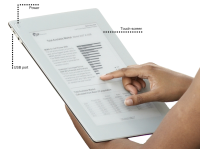Cambridge develops super thin e-paper

This is something for sore eyes; it certainly got my lower jaw dropped to the desk. The University of Cambridge, besides being loathed by almost everybody at my university (long story, another day) have once again excelled themselves in the technological field by developing this idea, whereas Plastic Logic, are manufacturing the device.

It is designed to work wirelessly, although specification not confirmed, but also with wires if you so choose. After speaking to someone in the know, the chance of the device having multi-touch capabilities are "slim to none", however it will have single touch support - allowing you to "flick" the pages of the document you are reading.
A whole wealth of videos are available on YouTube, and another interesting one on their home page, but this seems to be something which could be highly useful for university students. No more will we have to carry round a whole load of books, material and notes. We can sit in lecture theatres and gallantly flick through the slides on our single, notepad thin device... in 2009 that is, when the device hits the shelves. Nobody seems (?)
So, finally - we have electronic device which is a reasonable enough size and weight to potentially replace ordinary paper. This'll either change the world, or bankrupt the company. Your thoughts?